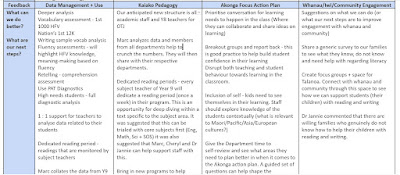SECOND PHASE
means the period from the end of the Transition Phase to the end of three
For this second phase of the self-review we looked at four key areas of the self-review rubric. These areas are:
- Data Management + Use
- Kaiako Pedagogy
- Akonga Focus Action Plan
- Whanau/Iwi/Community Engagement
We wanted to explore (in depth) what we are currently doing for each area and then start the dreaming and hoping - what are our next steps for our action plan.
Where are we at?
 |
| Self-Review - Where are we at? |
What are our next steps?
 |
| Self-Review - What are our next steps? |
This is where the conversation takes a different direction. We start talking about what we CAN do and what we hope to achieve. I like this part, I am a bit of a dreamer and it is always fun to talk about the possibilities.
For Data Management + Use we understand that whilst we do collect and collate data, not all teachers are using it effectively. One possible next step that I found particularly exciting was the idea of getting a representative from each department to work with our literacy strategist (Mr. Milford) in being part of the process - crunching and understanding the data and then sharing this back to their respective learning areas. It is good PLD and it will really put on the ownership and responsibility of literacy to all teachers in all departments.
Kaiako pedagogy was an interesting area to talk about because there variances across the school on where teacher's stand with literacy however one of the steps I suggested was taking our school goal number 3:
Goal 3 Literacy and Numeracy
By the end of Year 10, 80% of students will be reading at or above the expected level
By the end of Year 10, 70% of students are writing at or above the expected Curriculum Level.
By the end of Year 10, 70% of students are achieving in Mathematics at or above the expected Curriculum Level.
That 90% of Year 11 students will achieve NCEA Literacy.
That 90% of Year 11 students will achieve NCEA Numeracy.
Taking this goal and give departments manageable chunks on what they can do to reach this goal. Better yet, what literacy strategies they can integrate and who they can work with to achieve these literacy goals. The hope is that this will give staff the confidence that they can drive great literacy practice in their classroom. I believe that confidence ( or lack thereof) is a barrier with how staff teach and foster literacy. Having a good understanding on what the goal and HOW they can achieve and WHAT they can do to get there will hopefully give them that extra boost.
Akonga Focus Action Plan is all about student centered teaching and leadership. Again like the areas mentioned earlier, there is good practice happening in the school. The area for opportunity that I think should be prioritized is to give all learning areas sufficient time to really plan well and to look at who their students are and what they can to support them effectively. Time is precious, but I think that if we can buy some it can really help teachers understand who their learner is and tailor the program to their students. Giving teachers some great direction, guiding questions and tools can help shape great practice.
Whanau/Iwi/Community Engagement is such an important of student's learning journey. Students can really flourish and thrive if they feel supported and understood not just from their teachers but also from their families. Dr Jannie suggested that a way to achieve this is to connect with whanau and see how we can help them support their students with reading and writing. Families want to help, they want to support their child and for some, they do not know how to. So making a deliberate effort to prioritize this is recommended move on our part. We do have some opportunities that we have taken advantage of already to start this process through the various parent initiative groups, mentor conferences and project based learning classes that work with communities and whanau. We would also like to use this as leverage.
At this stage, the self-review is collection of the ideas from all team members. This has been shared with Julie Luxton who will collate the ideas and help form an action plan with us.




No comments:
Post a Comment